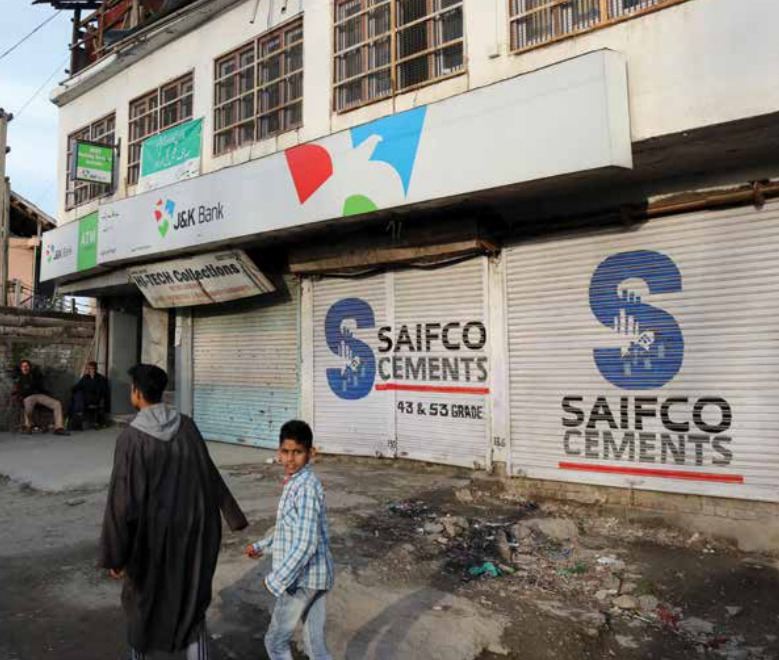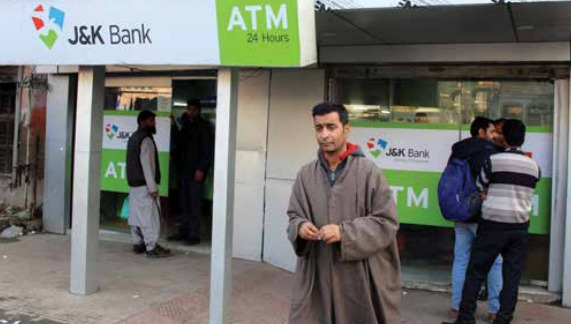India has crossed 100 Internet Shutdowns in 2018, but very little is discussed about how they affect daily lives. Starting today, MediaNama is publishing a series on the impact that Internet Shutdowns have on peoples lives. These were originally published by the Centre for Internet & Society , and written by reporters working with 101Reporters.com, in a report which was released on May 17th 2018.
*
By Safeena Wani, 101 Reporters
Inside a buzzing branch of the Jammu & Kashmir Bank in Srinagar, 27-year-old Falak Akhtar is busy processing routine transactions. A member of the technical team, this young banker says that almost half of the branch’s customers have registered their accounts with the M-Pay mobile app. However, the application built for convenience is not always dependable. As she attends to the rush of customers inside the branch, Falak reminds us that whenever there is an internet shutdown, the app is of no use. “The customers have to resort to traditional banking,” she says.
Everyday, Falak’s branch executes 53% of its transactions online. “If the customers do online transactions, the cost per transaction for the bank is only Rs 7. But every time an internet ban is enforced in Kashmir, the cost of each transaction goes up to Rs 54,” she says.
Given that internet shutdowns in Kashmir are usually accompanied by an imposition of a physical curfew, simply going to the bank can be impossible. Ironically, it is during political tensions that Kashmiris, stuck indoors due to curfew or avoiding the streets to keep safe, need internet banking the most.
Zahid Maqbool, an information officer with the J&K government, uses the J&K Bank’s mobile app regularly to transfer money or do transactions. “But last year, when my brother studying outside the state needed money, I couldn’t use the app because of the internet ban,” he says. “During the tense situation and curfew, I took a huge risk to reach to the branch in Tral, where only two employees were present.” It took him around three hours to transfer Rs 12,000 ($185) to his brother’s account “because the bank’s internet line was also running very slow”.
Showkat (name changed), manager of an ICICI Bank branch in Srinagar, says they use internet facilities of BSNL and Airtel during normal days. “Our branch has 20,000 customers, and around 40% of them use digital banking through an app called I-Mobile,” he says. The bank was not able to do online transactions throughout the summer, in the wake of the shutdown following Burhan Wani’s death. “And whenever there was a relaxation in curfew or strike, there used to be a huge rush of customers in the branch,” Showkat says.
“Whenever an internet ban is on in Kashmir, we suffer huge losses because we don’t manage to get new account holders,” says Showkat. “Since we run most of our operations online, the ban blocks the account holder from accessing the net and uploading scanned ID proofs.”
On an average, his branch opens 100 accounts per month. “But last year, amid the internet ban, we managed to open only 40 accounts in six months,” he says. For processing these account opening applications, the bank had to courier the forms to Chandigarh, the bank’s nerve centre in North India. Account openings take 24 hours online, but here, the forms took six days to reach Chandigarh, after which it took another 8 days to process it.
To overcome hurdles faced during last year’s internet gag, the bank used the Indian Army’s VSAT network on lease. Showkat says such a line can be used for commercial purposes after clearance from the Army and a payment of Rs 15,000 per month. “Our ATMs were connected through that lease line,” he says. “But the problem was that the gag had slowed down the VSAT as well.”
The slow-speed internet hampered cash withdrawals from ATMs, which created quite a furore. “The already frustrated customers started shouting that the bank employees were cheats, that we were irresponsible. It is very difficult to make them understand the technical aspects of it,” he says.
Although banks suffer during frequent internet gags, their plight is often overshadowed by the bigger political crisis in Kashmir. What’s clear is that disrupted banking, fee payments, purchases and withdrawals, all severely cripple the everyday life of Kashmiris.
In 2016, angry customers, barred from e-banking due to internet clampdown, thronged banks after months, demanding they be given some respite on EMIs (monthly loan repayments) and other banking schemes. An official from the branch of a nationalised bank outside Srinagar says that when they refused to entertain such requests on procedural grounds, the customers entered into heated exchanges.
Showkat says that customers who had taken loans were neither able to repay the installments online, nor were they able to visit the branch because of unrest. “These customers then end up having to bear the high interest rate, and some of them had to face penalties.”
Mudasir Ahmad, the owner of a Kashmir Art Emporium in Central Kashmir’s Budgam, says that he had borrowed a loan of Rs 40 lakh ($62,400) from J&K Bank as capital for his handicraft business, but he had missed seven loan installments last summer due to the internet clampdown. “I usually pay my loan installments through e-banking. Last year, when the internet was not working, I had to visit the bank to repay it.
There are such long queues. It took me a whole day last year to pay one installment, which I otherwise pay within minutes through e-banking.” Digital banking was introduced in Kashmir few years ago in an effort to reduce footfall in banks and increase online transactions. Online banking done through cards and apps was hailed as a step towards a cashless economy. Abdul Rashid, a relationship executive of a State Bank of India branch in Srinagar, says, “But because of the internet gag at most times, we are not able to be a part of it.”
*
Safeena Wani is a Srinagar-based freelance writer and a member of 101Reporters.com, a pan-India network of grassroots reporters.
Cross-posted here with permission under the CC BY-ND 4.0 license. Photographs by Mohammad Abu Bakar.
































